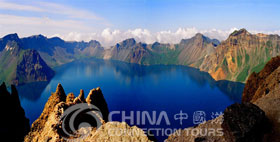Jilin Province is located in the central part of northeast China, adjoining Heilongjiang in the north, Liaoning in the south, and Inner Mongolia in the west. It is adjacent to Russia in the east and in the southeast the Tumen and Yalu rivers form the border between the People's Republic of China and North Korea. Jilin is highest in altitude in the southeast, and drops gently towards the northwest. The Changbai Mountains run through its southeastern regions, and contains the highest peak of the province, Baiyun Peak at 2691 m. Jilin is drained by the Yalu and Tumen Rivers in the extreme southwest, by tributaries of the Liao River along the southern border, and by the Songhua and Nen rivers, both eventually flowing into the Amur.
Jilin has a northerly continental monsoon climate with long, cold winters and short, warm summers. Average January temperatures range from -20 to -14°C (-4 to 4F). Rainfall averages at 350 to 1000 mm.
Anciently Jilin was inhabited by various peoples, including the Mohe and the Wùjí. During the Qing Dynasty much of the area was under the control of the General of Jilin, whose area of control extended to the Sea of Japan to encompass much of what is Russia's Primorsky Krai today. Immigration of Han Chinese into the area was strictly controlled. However, after the Primorsky Krai area was ceded to Russia in 1860, then the area was opened up to Han Chinese migrants, most of whom came from Shandong Province. By the beginning of the twentieth century, Han Chinese had become the dominant ethnic group in the region. In 1932, the area was incorporated into Manchukuo, a puppet state set up by Japan. After the defeat of Japan in 1945 the region, together with the rest of northeastern China was handed to the communists by the Soviet Union. Manchuria was then the staging ground from which the communists eventually conquered the rest of China.
Recently Jilin has, together with the rest of the heavy industrialized northeast of China, been facing economic difficulties. This has prompted the central government to undertake a campaign called “Revitalize the Northeast.”
Jilin is inhabited by Han Chinese, Koreans, Manchus, Hui, Mongols and Xibe. Most ethnic Koreans live in the Yanbian Korean Autonomous Prefecture. At the end of the year 2005, the total population stood at 27.16 million, an increase of 75,000 from the 2004 figure.
The province boasts rich tourism resources. In the provincial capital, Changchun, there are the former government offices of the Manchurian State established by the Japanese during World War II, the Jingyuetan Forest Park, the Monument to the Martyrs of the Soviet Red Army, the automobile town, and the Changchun Film Studio.
 In Jilin City, there are the mountain city of Gaojuli on Mount Longtans; Beishan Park; the Songhua Lake in Fengman; the Baohai Ancient Tombs in Mount Liuding of Dunhua; the Chengzishan mountain city in Yanji; the Changbaishan Nature Reserve that covers a vast area in the three counties of Changbei, Antu and Fusong and boasts scenic spots such as Heavenly Pond, waterfalls, and groups of hot springs and grand canyons.
In Jilin City, there are the mountain city of Gaojuli on Mount Longtans; Beishan Park; the Songhua Lake in Fengman; the Baohai Ancient Tombs in Mount Liuding of Dunhua; the Chengzishan mountain city in Yanji; the Changbaishan Nature Reserve that covers a vast area in the three counties of Changbei, Antu and Fusong and boasts scenic spots such as Heavenly Pond, waterfalls, and groups of hot springs and grand canyons.
In Tonghua, there is the Tomb of General Yang Jingyu. In Ji'an, there are the Wandu mountain city; Donggou Ancient Tombs; the General Mausoleum known as the "oriental pyramid" and the stone tablet of King Haotai. In additon, the Liao Pagoda in Nong'an and the group of volcanoes at Yitong offer something different to the tourist.
The Goguryeo sites and tombs found in Ji'an, Jilin, including Wandu, Guonei, and the pyramidal General's Tomb, have been listed as part of a UNESCO World Heritage Site. The Changbai Mountains, especially Lake Tianchi on the border with North Korea, are popular tourist destinations due to their natural scenery.
Ancient Tombs at Longtou Mountain, include the Mausoleum of Princess Zhenxiao, the royal tombs of the Balhae kingdom (Bohai in Chinese) found in the Yanbian Korean Autonomous Prefecture.
Among the city's five-star hotels are Mingmen Hotel and the Shangri-la Hotel.

